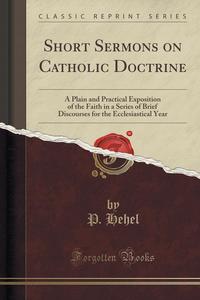Excerpt from Short Sermons on Catholic Doctrine: A Plain and Practical Exposition of the Faith in a Series of Brief Discourses for the Ecclesiastical Year
"Thou shalt not have strange gods before me," this prohibition is made the first of the commandments of God. This command does not merely forbid the worship of false gods; indeed, if such were the case Christians could not possibly fail against it because they all believe in the true God. Those, therefore, who interpret the command in this manner fail entirely to understand its meaning. God, by forbidding us to have strange gods before Him, commands us at the same time to duly acknowledge and honor Him as the sole and only true and eternal God.
Hence we are required by this command to believe in one God, to place our hope for salvation in Him alone, and to love Him as He deserves to be loved. The first commandment, therefore, obliges us to believe, to hope, and to love, to have faith, hope and charity, called the divine virtues. God ordains in this first commandment that our entire being should be devoted to Him, and these three acts, believing, hoping and loving, embrace our all, our body and soul, time and eternity. This commandment alone will suffice for our salvation, if we are faithful to it. The three divine virtues must, therefore, claim our first attention, and to-day we will con template the virtue of faith by considering the three essentials: What is faith? How do we obtain faith? How can we lose the gift of faith?
What is faith? Faith is the firm belief in the truth of every thing that God teaches through the Catholic Church. I say, belief in everything. Not merely a part, not one or two articles, but every thing that the Church proposes for belief. We cannot be half believing and half unbelieving. The Church proposes nothing for our belief but that which God has ordained for belief.
About the Publisher
Forgotten Books publishes hundreds of thousands of rare and classic books. Find more at www.forgottenbooks.com
This book is a reproduction of an important historical work. Forgotten Books uses state-of-the-art technology to digitally reconstruct the work, preserving the original format whilst repairing imperfections present in the aged copy. In rare cases, an imperfection in the original, such as a blemish or missing page, may be replicated in our edition. We do, however, repair the vast majority of imperfections successfully; any imperfections that remain are intentionally left to preserve the state of such historical works. Это и многое другое вы найдете в книге Short Sermons on Catholic Doctrine (P. Hehel)
